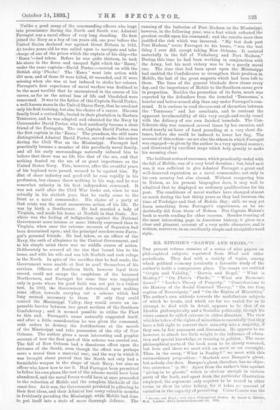MR. RITCHIE'S "DARWIN AND HEGEL."* THE present volume consists of
a series of nine papers on philosophical subjects, reprinted from Mittel and other periodicals. They deal with a variety of topics, among which political economy (evidently a favourite study of the author's) holds a conspicuous place. The essays are entitled "Origin and Validity," " Darwin and Hegel," " What is Reality P" " On Plato's Plundo,' " " What are Economic Laws P " " Locke's Theory of Property," " Contributions to the History of the Social Contract Theory," "On the Con- ception of Sovereignty," and " On the Rights of Minorities.' The author's own attitude towards the multifarious subjects of which he treats, and which are far too varied for us to attempt to deal with in detail, appears to be that, of an Idealist philosophically and a Socialist politically, though his views cannot be called extreme in either direction. The view which h e takes of the rights of minorities is essentially that they have a full right to convert their minority into a majority, if they can, by fair argument and discussion. He appears to us, however, to attach too little weight to the influence of educa- tion and special knowledge or training in politics. The more philosophical parts of the book seem to be closely reasoned, but here and there we meet with an error or an oversight. Thus, in the essay, " What is Reality P " we meet with this extraordinary proposition : "Macbeth sees Banquo's ghost, but nobody else does. Banquo's ghost, therefore, has no objec- tive existence." (p. 80.) Apart from the author's bias against " giving-in to ghosts," which is obvious enough in various parts of the book, and apart from the particular illustration employed, the argument only requires to be stated in other terms to show its utter fallacy, for it takes no account of variation in the capacity of perceiving. Caine Cossus was the ". Darwin mei Treget; with other Plamophical Studio; By lln.vid (4, LA. Loudon ; Bwau Sonneasehoin. and Co. 1895. only man fighting by the side of Anlus who could distinguish the advance of Mamilius and his horsemen ; ergo, they had no objective existence. The superintendent of a blind asylum sees a rainbow, but nobody else does ; therefore, there is no such thing as a rainbow.
In discussing Austin's conception of sovereignty, Mr. Ritchie rather oddly prescribes a journey to Hades for supposititious opponents. " If an Austinian lawyer objects to speak of a document as the legal sovereign, he must wander about in his search for ' determinate persons until he finds George Washington, Alexander Hamilton, Benjamin Franklin, James Madison, and others—all of whom are now dead." (p. '244.)
The essays on Darwin and Hegel," and on "Plato's Ph wdo," will probably he found most interesting to the general reader. In the former, Mr. Ritchie compares and contrasts such of the views of Darwin and Hegel as bear upon each other. He shows an evident bias towards the idea of Evolution as opposed to that of Emanation ; but why should not both views be equally true P Emanation may be beyond our reach, except as a philosophical conception, for it actually deals with the unknown origin of things ; but if we adopt Evolution as the only theory of the universe, we seem to be driven back upon the very antithesis of the whole idea of Evolution itself, the unphilosophical and now practically exploded theory of the origin of the universe out of nothing.
In the essay on " Plato's Phasclo,' " Mr. Ritchie discusses Plato's views on the origin and destiny of the soul, not only as set forth in the " Phesdo," but also in Plato's other works, such as the " Phredrus " and the " Republic," with reference to the views of Aristotle and of various modern writers. We should like to see this essay expanded into a volume, with fuller illustrations, from a much greater variety of sources. Towards the end of the essay, Mr. Ritchie takes occasion to note that Plato " exaggerates the significance of the mere individual exigence so much in his doctrine of metempsychosis as to neglect the greater ethical significance of the person, which, as just said, depends on membership of a society." Why does he here omit to notice the philosophy of Swedenborg, who describes the other world as an entire congeries of societies ? We may take any view we please of modern mystical writers, but it is not fair, to ignore them altogether in metaphysical discussions. Perhaps they are regarded as "unphilosophical." But might not the same reproach be made to apply likewise to ancient writers, even to Plato himself, profound as his influence has been on all philosophy since his time, and even on Christianity itself, especially owing to the character of the philosophy of the New Testament, which, though partly based on Platonism and Neoplatonism, is too fragmentary to form a complete and satisfactory system of philosophy without being largely supplemented from extra-Biblical sources



















































 Previous page
Previous page